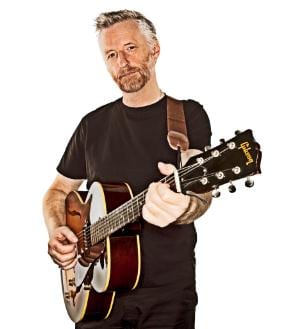British alt-rock musician and leftwing activist Billy Bragg formed the punk-rock band Riff Raff in 1977. He was touring London’s pubs and clubs when one day, in the spring of 1978, he joined 100,000 people in the first-ever Rock Against Racism march, from Trafalgar Square to East London, to see an outdoor concert at Victoria Park, organized to counteract rising racist attacks across Britain.
Headliners that day included The Clash, Buzzcocks, Steel Pulse, Generation X and the Tom Robinson Band, who recorded the landmark song “Glad to Be Gay.”
“Today ‘Glad to Be Gay’ sounds like a lovely little song, but back then you could get your fuckin’ head kicked in for being gay,” Bragg says. “So Tom Robinson sang this song, and then all the guys that were standing around me and my mates, all these guys started kissing each other on the lips, and we turned around and saw we were standing under a banner that said ‘Gays Against the Nazis.’ They’d been marching behind us in the parade and we hadn’t realized it, and then I realized this wasn’t just about racism, it was about prejudice, bigotry – and that also means equal rights for gay, lesbian and trans people.”
Bragg has never forgotten that moment. In fact, that epiphany turned Bragg – who has a wife and son – into one of Britain’s most vocal advocates for gay civil rights, a standing he cemented with gay audiences when he recorded his 1991 anti-homophobia and sex-positive hit song “Sexuality,” which he wrote with guitarist Johnny Marr of The Smiths.
“Every night I perform ‘Sexuality’ I dedicate it to those who are fighting for [gay civil rights] and equal marriage,” Bragg says. “We don’t want to live in a society where people are defined by gender or sexuality, and I’ve always tried to reach out to people who are marginalized by society.”
The song is a concert highlight on Bragg’s current North American tour promoting his new album Tooth & Nail (Dine Alone Records), his first studio album in five years, produced by Grammy Award-winning songwriter and producer Joe Henry and recorded live, with no overdubs, in five days. Bragg was inspired by a fan’s tweet referring to Bragg as “The Sherpa of Heartbreak,” and subsequently the album’s 12 tracks were written with an eye toward the personal rather than the political.
“Fundamentally, my politics are about compassion, about caring for other people, and the struggle to maintain relationships with people we love as we try to make this world a better place,” says Bragg, now 55 and considered a national treasure in England.
“There is no major record label that wants to bankroll what I do now because I’ve been around a long time and am [still] not considered to be mainstream enough. So does it make sense [for me] to invest in the recording and promotion of a new album?” he asks rhetorically. “It would have been simpler for me to put out songs on the internet and do a few shows, but I have something to prove: it’s time to engage with the record industry on my terms, if that’s possible. It’s not going to make me a pop star again, but it’s a gamble worth taking.”
Billy Bragg and his band perform at MacEwan Hall in Calgary (Mon, April 8), The Orr Centre in Regina (Tues, April 9), the Garrick Centre in Winnipeg (Wed, April 10), the Danforth Music Hall in Toronto (Fri, May 3), the Bronson Centre in Ottawa (Sat, May 4), and Club Soda in Montreal (Sun, May 5).


 Why you can trust Xtra
Why you can trust Xtra


